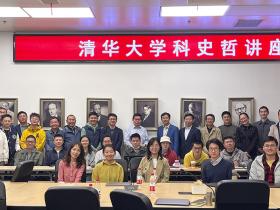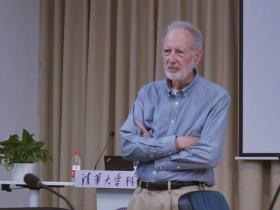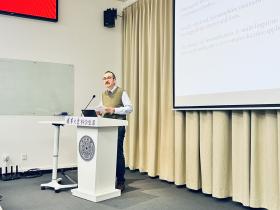On February 24, 2023, the 51st lecture of the THU History of Science, Philosophy, and Technology Lecture Series was held in the Department of History of Science at Tsinghua University. The lecture was delivered by Dr. Dong Qiaosheng and chaired by Ms. Jiang Che.
Dr. Dong began by noting that "life" is a topic closely related to everyone, and in ancient Greece, it was a subject of interest not only to physicians but also to philosophers. In discussing the functions of the brain and testes, Aristotle and Hippocrates held opposing views. Aristotle argued that the brain was unrelated to seed production or reproduction, emphasizing instead the heart as the organ of thought. He also claimed that the testes were irrelevant to reproduction, serving at most to maintain bodily balance. In contrast, the Hippocratic Corpus attributed significant roles to both the brain and testes in reproduction, with the brain serving as a repository for seeds and the testes as temporary storage.
On the theory of conception, the Hippocratic Corpus and Aristotle also held divergent views. The Hippocratic Corpus viewed menstruation as the expulsion of excess blood, which, if not properly expelled, could lead to various illnesses in women. They posited that the uterus, driven by a “desire for seed”, could move within the body, even leading to suffocation and death. Plato echoed this view, describing the uterus as a “non-rational creature within a woman’s body”.They advocated for conception as a remedy for menstrual disorders and female health issues, believing it could soothe the uterus and allow the fetus to absorb excess blood. They concluded, “ I urge young women suffering from this condition to live with men as soon as possible, for if they become pregnant, they will recover.”
Aristotle disagreed, arguing that menstruation was essential for embryonic development, as blood was the source of seeds. He also rejected the idea of a mobile uterus, describing it as fixed and passive. Regarding infertility, Aristotle attributed it to imbalances in seed composition or damage to reproductive pathways, advising individuals to seek compatible mates. In contrast, the Hippocratic Corpus recommended environmental, dietary, and lifestyle changes.
Regarding gender and heredity, ancient Greek natural philosophers offered diverse perspectives. Alcmaeon attributed fetal gender to the dominance of paternal or maternal seeds. Hippocrates emphasized the strength and consistency of the seed mixture. Empedocles linked gender to uterine temperature, while Parmenides cited implantation location. Aristotle adopted Empedocles' approach, likening parental contributions to form and matter, with the mother providing the material basis for individual variation.
On embryonic development, the Hippocratic Corpus suggested that fetal growth mirrored cosmic processes, while Aristotle viewed the male seed as triggering a pre-programmed developmental sequence. Aristotle also outlined three stages of fetal soul acquisition: the nutritive soul at conception, the sensory soul later, and the rational soul at 14 days, marking the fetus as human and prohibiting abortion. This idea influenced Christian thought and abortion debates in the US.
Regarding childbirth, the Hippocratic Corpus portrayed it as an active fetal effort to escape confinement, with crying as a response to insufficient prenatal nutrition. They also held the mysterious belief that seven-month fetuses could survive, but eight-month fetuses could not. Aristotle disagreed, attributing birth to uterine contractions and supporting the viability of eight-month fetuses. He also believed celestial movements influenced childbirth.
Following the lecture, professors Wu Guosheng, Jiang Che, Hu Yilin, Alberto Bardi, Shen Yubin, and Yan Bichen, along with students, engaged in extensive discussions on the topics presented.
Author: Xu Siyuan
Reviewer: Jiang Che





